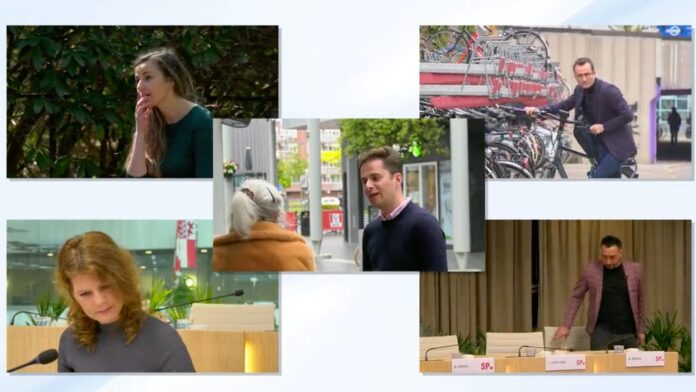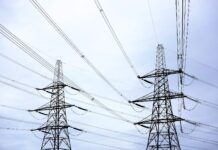The housing shortage, liveable neighbourhoods, increasing poverty and the climate crisis are enormous challenges for Eindhoven. Over a year ago, a new city council and coalition started to tackle the problems. Studio040 takes stock with five political party chairpersons: Remco van Dooren (CDA), Eva de Bruijn (GroenLinks), Virginia Jonkers (Partij voor de Dieren), Murat Memis (SP) and Lex Janssen (VVD).
Overall, the five politicians look back on the first year with satisfaction. They feel they really got something done. Whether it is tackling the climate crisis, housing nuisance or more police officers on the streets.
Diverse achievements
“We are doing a lot of greening in the city, together with residents. The city centre is also becoming greener. Furthermore, we are paying attention to people worried about their energy bills. We have been able to help them,” says De Bruijn about the role GroenLinks has been able to play. Van Dooren: “Safety in Eindhoven was not in good shape. That’s why the number of district GGD officers and enforcers has been increased. There are now also more stewards for safety in the hospitality industry. That is also to the credit of the CDA.”
Upbeat opposition
Coalition parties GroenLinks and CDA are thus convinced of what they have been able to do. But the opposition is not dissatisfied either. Memis: “We have been able to leave our mark on the problem of residential nuisance in neighbourhoods. Neighbourhoods that sometimes can no longer cope. Partly because of the SP, a number of areas have now been locked down, and no more residential splitting can take place here.” The opposition party VVD is also optimistic. “We always insist on affordability and feasibility of large plans, such as Fellenoord, where 10,000 homes are to be built. We always mention the risks and point out that ambitions sometimes must be adjusted,” says VVD chairman Janssen. Opposition VVD is thus trying to influence the city council, as is the Partij voor de Dieren. “We always dare to put our finger on the sore spot. We believe that substantial changes are needed for the climate. Other parties are a bit less so. We worry about this and therefore keep other groups on our toes,” Jonkers says.
Big concerns about the future
Yet, besides achieving goals, there are also concerns among the groups. Jonkers: “Participation is not going well in the city right now. Residents want something we cannot meet. There is too little listening to residents, and that is serious.” Memis is annoyed by the lack of decisiveness on the part of the city government. “We are now missing agreements. There are nice plans, but tackling things is now being pushed forward.” The VVD thinks the mayor and alderpersons are doing too much wishful thinking. “The city is growing to 300,000 inhabitants. At the same time, we see many traffic arteries being closed. That is not realistic. People have to get to their places anyway.”
The coalition parties also have concerns but do not point their arrows so much at the college. “The issue we all need to start thinking about is the city’s growth. It squeaks and creaks everywhere with respect to housing, care or space. So we need to consider what kind of city we want to be. As far as we are concerned, that is not unbridled growth,” De Bruijn explains. Van Dooren: “Sometimes I do wish the municipality would act a bit more like a company. It could all be a bit faster sometimes.”
The importance of cooperation
To tackle the problems, good cooperation is important not only among the coalition parties but also between the opposition and the people in the city. Janssen: “The cooperation within the council is good. Sometimes you pull together, and sometimes you want to make your own point. That’s fine too.” Memis acknowledges. “We try to convince each other. And if we have a good story, we succeed.” The Partij voor de Dieren is slightly more sceptical. “We do notice that backroom politics is practised. Things are sometimes settled in advance, although we have no real concerns about that yet,” Jonkers says.
The coalition parties say they are keen to work together and not just among themselves. De Bruijn: “The door is always open for other parties. We can always improve this.” Van Dooren adds. “We like to work together, also with the opposition. But sometimes, you have to coordinate things internally beforehand. That’s also part of governing.”
A ticking time bomb
The opposition says it has enough confidence in the coming years and the direction the coalition is now taking, even though there is still plenty of work to be done. Janssen: “Now, for example, I hear that an alderperson is doing their best to tackle difficult issues such as the housing shortage. But doing your best is not enough. I still got away with that at school, but not as an administrator of the country’s fifth largest city.”
The Partij voor de Dieren agrees. “They need to start tackling it now,” emphasises PvdD. According to the coalition party CDA, there is no lack of good plans, but the next three years will come down to good implementation. “That is the challenge. But I am confident that this will definitely succeed.”
Source: Studio040
Translator: Martijn











